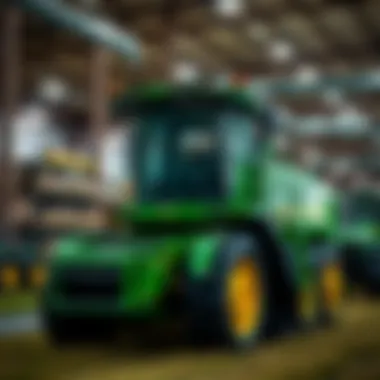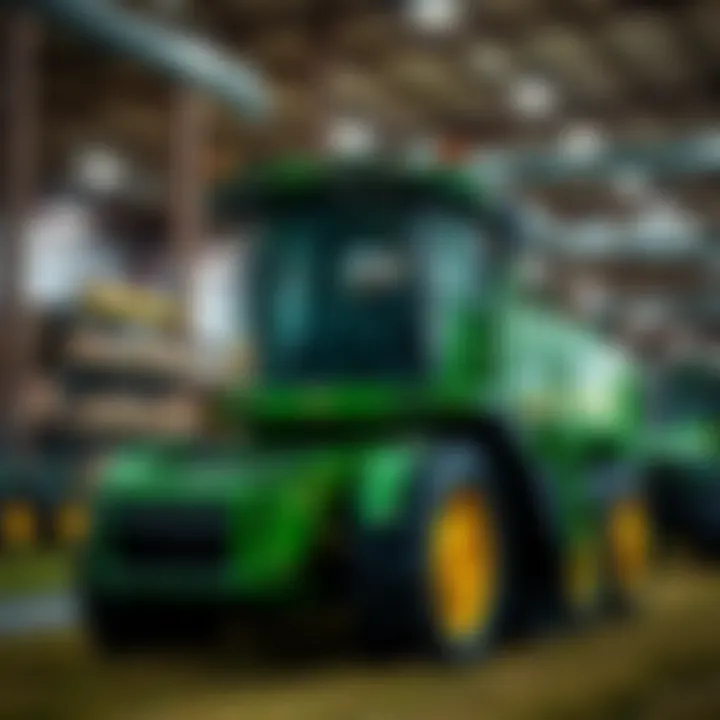The Impact of John Deere in Rosemount, Minnesota


Intro
John Deere stands as a beacon of agricultural innovation and reliability—especially in the quaint town of Rosemount, Minnesota. With a deep-rooted history in farming machinery, this company has woven itself into the very fabric of the agricultural community in the region. Rosemount, with its fertile fields and vibrant farming culture, offers an ideal backdrop for John Deere's operations and contributions.
Through collaboration with local farmers and various agricultural programs, John Deere not only enhances productivity but also drives sustainability practices in modern farming. Moving forward, this article seeks to dissect the immense impact that John Deere has on the local economy, probe into its history here, explore the advancements in technology and machinery, and finally, consider how the company engages with the community at large.
By having a close look at John Deere’s various product offerings and its connection to sustainable practices, one can appreciate not just the mechanics behind the machines, but also the philosophy guiding the brand. This analysis ultimately aims to present a holistic view of the symbiosis between John Deere and the agricultural landscape of Rosemount, skimming the surface of innovation while delving into the everyday realities faced by farmers.
It is essential for those who are entrenched in agriculture—whether farmers or enthusiasts—to grasp what John Deere represents in this localized context.
Preamble to John Deere
In the realm of modern agriculture, few brands resonate as strongly as John Deere. This iconic name is synonymous with farming excellence, with roots that trace back to a time when the plow was the backbone of agricultural innovation. As we embark on this exploration of John Deere's role in Rosemount, Minnesota, it becomes evident that this company is not just about machinery; it is intertwined with the very fabric of the local community and its agricultural practices.
John Deere's influence stretches far beyond mere equipment—it's about an agricultural legacy that has shaped farming techniques and revolved around farmer requirements. With technologies that help enhance productivity and sustainability, John Deere has been a beacon of advancement for farmers who are looking toward the future. This article will illuminate how the company has integrated its innovations into the daily lives of regional agricultural professionals, ensuring that they not only keep pace but thrive in an ever-changing environment.
The Legacy of John Deere
Founded by a blacksmith in 1837, John Deere began with a simple yet revolutionary idea: a polished steel plow that could cut through the dense Midwestern soil without clogging. This foundational product gave birth to an empire that would transform farming across the United States and beyond. Over the years, John Deere has maintained an enduring dedication to quality, reliability, and service.
The legacy of John Deere is also reflected in its enduring commitment to environmental stewardship and community engagement. The company has continually sought to adapt its products and practices to meet the needs of both farmers and the land. As a result, John Deere has emerged as a leader in sustainable agriculture, not just in Rosemount, but throughout the globe. This commitment has fostered loyalty among farmers who see John Deere as a partner in agriculture, not merely a supplier of tools.
"Innovation is the heartbeat of John Deere's legacy, driving us to improve the lives of farmers every day."
Overview of Rosemount, Minnesota
Nestled in Dakota County, Rosemount is characterized by its robust agricultural landscape that complements John Deere's operational ethos. The city is a quintessential example of rustic Midwest charm wrapped in a vibrant community spirit. With a population that thrives on agriculture, Rosemount serves as a fertile ground not only for farming but also for the development of agricultural technologies.
Agriculture remains the mainstay of the local economy, and Rosemount is home to many farm operations that contribute significantly to the region's output. These enterprises range from conventional farming to innovative practices that leverage advanced technology, making the community an ideal partner for John Deere. The cooperative culture among local farmers, combined with accessible resources like workshops and training sessions offered by John Deere, sets a foundation for continuous growth and learning.
Historical Context
Understanding the historical context of John Deere's operations in Rosemount, Minnesota, is essential for appreciating its role in the community and its contributions to the agricultural landscape. The narrative of John Deere here isn’t merely about machinery and equipment; it reflects a deeper connection to the farming culture and economic fabric of the area. A closer examination of its origin and growth allows us to grasp how the brand has resonated with farmers, influencing their livelihoods and the surrounding community.
Founding of the Rosemount Branch
The establishment of the John Deere branch in Rosemount can be traced back to the mid-20th century when the agricultural industry was evolving at a rapid pace. It was around this time that there was a dire need for improved agricultural machinery that could sustain larger operations. The Rosemount facility emerged as a response to that need.
Originally, the plant focused on manufacturing equipment that addressed the specific demands of local farmers. As Rosemount is located in a region known for its rich soil and diverse farming practices, the branch quickly became an integral part of the agricultural community. The founders recognized that farmers needed more than just machines; they needed partners who could provide support and innovation.
Furthermore, the Rosemount branch has not only supplied machines but also a sense of community. It nurtured relationships with local farmers, establishing itself as a backbone of agricultural support in the region. The founding of this branch was not just a business decision; it was a commitment to the long-term viability of farming in Minnesota.
Growth of John Deere in the Region
As the years rolled on, John Deere's footprint in Rosemount expanded significantly. The growth was marked by technological advancements in equipment, reflection of changing agricultural methodologies, and increasing demands of farmers in the region.
As equipment technology advanced, John Deere was quick to adapt, integrating innovations that addressed the farming challenges faced by local stakeholders. For instance, the introduction of GPS in tractors enabled enhanced precision farming, which has been crucial for maximizing crop yields while minimizing resource wastage. These evolutions not only streamlined operations but also positioned local farmers to compete in a global marketplace.
- Community Engagement: John Deere's growth also emphasized community initiatives, such as partnerships with local schools to teach students about agriculture and technology. These programs cultivated a future workforce that is not only skilled but also passionate about farming.
- Economic Contributions: The expansion of the Rosemount branch generated job opportunities and spurred the local economy. Farmers, technicians, and administrative staff all found employment within the increasingly bustling facility, fostering a thriving economic environment.
In summary, the historical context surrounding John Deere’s journey in Rosemount is a tapestry woven with innovation, community loyalty, and a focus on sustainable growth. It illustrates how a company can influence not only the economic fabric of a region, but also the lives of those who call it home. As we dig deeper into the various facets of John Deere's influence, this historical foundation proves instrumental in painting a larger picture of its impact today.
Product Range and Innovations


John Deere has a longstanding reputation in the agricultural industry, and its range of products highlights this legacy. In Rosemount, Minnesota, the significance of John Deere extends beyond just selling machinery; it encompasses innovations that respond to the evolving needs of modern agriculture. This section explores the company's key equipment, technological advancements, and how these factors contribute to sustainable farming practices.
Key Equipment and Machinery
Tractors
Tractors are considered the backbone of agricultural operations. John Deere's tractors combine power, versatility, and user-friendly design, making them a go-to choice for many farmers in Rosemount. Often touted for their efficiency and durability, these machines can handle various tasks, from tilling to hauling.
One notable characteristic of John Deere tractors is their adaptability. These units come in different sizes and specifications to suit diverse farming needs. Users appreciate how easily they can switch attachments, allowing a single tractor to perform multiple functions, thus saving both time and labor costs. However, while they are packed with features, the higher-end models can be a substantial financial investment for small-scale farmers.
"John Deere tractors are the heart of our farm; they make tough jobs look simple."
— A local Rosemount farmer
Harvesters
Harvesters made by John Deere deliver efficient crop collection, which is crucial during harvest season. The advanced technology incorporated in these machines significantly reduces crop loss. Farmers in the region rely on these harvesters not only for their effective performance but also for their ability to handle a variety of conditions and crop types.
A key feature of John Deere harvesters is their real-time yield monitoring. This capability allows farmers to assess their crop's performance as they harvest, leading to better decision-making for future planting seasons. A drawback can be found in their advanced systems, which may require additional training for operators to fully utilize the technology. Nevertheless, the long-term benefits can often outweigh the initial learning curve.
Irrigation Systems
Efficient irrigation is vital for crop health, especially considering Minnesota's variable climate. John Deere's irrigation systems are designed for precision and sustainability. The systems offer various options, such as drip and pivot irrigation, providing farmers with choices that can optimize water usage and improve yield.
What stands out about these systems is their ability to integrate with smart technology. Modern farmers can manage irrigation schedules from their smartphones, ensuring crops receive optimal moisture without wasting resources. However, the complexity of these systems may pose challenges in implementation and maintenance for some farmers, particularly those accustomed to traditional methods.
Technological Advancements
Precision Agriculture
Precision agriculture has revolutionized farming by using data analytics to improve crop yields and resource management. John Deere champions this movement through its advanced tools, allowing farmers to gather crucial information about soil health, weather patterns, and crop performance. This detail-oriented approach reduces waste while increasing productivity, making it highly relevant to today's farming practices.
The highlight of John Deere’s precision agriculture technology is its ability to provide real-time data. Farmers can make immediate decisions based on data rather than relying solely on seasonal predictions. A challenge, however, is that such technology necessitates a degree of digital literacy that may be lacking in some farming communities.
Telematics Systems
Telematics systems represent a leap forward in equipment monitoring. John Deere’s telematics offer insights into machinery performance, allowing farmers to track everything from fuel consumption to machine wear. This is particularly valuable for large operations in Rosemount, where efficiency is essential to profitability.
The key advantage here is predictive maintenance; farmers can foresee potential issues before they become costly repairs. Having access to such data helps ensure minimal downtime and maximizes the usage of equipment. However, concerns about the privacy of the collected data frequently arise.
Economic Impact on the Community
The presence of John Deere in Rosemount does not merely resonate in the fields of agriculture; it strikes a chord in the very fabric of the community itself. This section highlights how this industrial giant contributes to the local economy, creating job opportunities and fostering relationships with businesses around the area. This relationship between John Deere and the Rosemount community is essential in understanding the broader implications of agricultural mechanization on local and regional economies.
Job Opportunities Created
John Deere plays a pivotal role in providing employment opportunities for the residents of Rosemount. With various positions ranging from manufacturing to administration, the firm has become a cornerstone for many families relying on stable and rewarding jobs. In fact, the local plant not only provides direct employment but also has a ripple effect across the job market.
- Direct Jobs: The plant employs hundreds of individuals, many of whom are skilled laborers and engineers. These positions often offer competitive wages and benefits, allowing employees to support their families and contribute to the local economy.
- Indirect Jobs: Beyond direct employment, John Deere’s operations create a demand for ancillary services, such as maintenance, transportation, and supply chain management. Local businesses often depend on John Deere for consistent contracts and sales, amplifying the economic impact.
- Seasonal Opportunities: Particularly during peak agricultural seasons, John Deere hires temporary workers. These roles help meet increased production needs while also providing opportunities for students or those seeking short-term employment.
The economic footprint of a single corporation, such as John Deere, can reshape community landscapes. Its presence is about more than machinery; it’s about livelihoods.
Supporting Local Businesses
John Deere's influence extends into the realm of local businesses, nurturing an ecosystem where collaboration is the name of the game. Just as a farmer relies on partners—like suppliers and service providers—businesses in Rosemount benefit from John Deere's steady demand for various goods and services.


- Collaboration with Suppliers: Local companies that supply parts, materials, and services to John Deere have seen steady growth due to their partnership with the manufacturing giant. This symbiotic relationship allows small businesses to thrive amidst fierce competition from larger entities.
- Economic Stimulation: By supporting local vendors, John Deere plays a vital role in maintaining a vibrant economy in Rosemount. The money spent within the community has a multiplying effect, which greatly enhances local wealth, education systems, and infrastructure.
- Networking Opportunities: Events organized by John Deere—ranging from job fairs to tech showcases—serve as platforms where local businesses can showcase their products and services. These gatherings foster community ties and can lead to new business ventures.
By bolstering employment and supporting local enterprises, John Deere’s presence provides a robust economic shield for Rosemount. The community's relationship with this agricultural titan goes beyond machinery; it shapes the very essence of financial stability and growth.
Collaboration with Local Farmers
The partnership between John Deere and local farmers in Rosemount encapsulates a vital alliance that goes beyond mere commerce—it's about cultivating a community based on shared knowledge and innovation. This collaboration not only boosts agricultural efficiency but also nurtures sustainable practices that promote environmental stewardship.
Training and Support Programs
One of the most significant aspects of this collaboration is the array of training and support programs tailored specifically for local farmers. John Deere recognizes that modern agriculture demands more than just robust machinery; it requires a knowledgeable user base capable of leveraging new technologies to improve yields and efficiency.
These training initiatives cover various topics, from basic machinery operation to the intricacies of advanced technology in farming. Farmers partake in hands-on workshops where they learn how to operate the latest tractors and harvesters, ensuring they get the most out of their investments. Moreover, John Deere offers online resources, instructional videos, and customer service hotlines to provide ongoing support. As one local farmer aptly noted,
"Having direct access to expert guidance and support makes all the difference when you're out in the field. It's like having a safety net beneath you."
Such programs not only enhance individual farmer skills but also foster a community of practice. Farmers become part of a broader network where shared experiences and strategies circulate, thus creating a collective intelligence that can address local challenges effectively.
Customer Feedback and Product Development
Another cornerstone of John Deere's relationship with local farmers is the emphasis on customer feedback in product development. This process is not merely a box-checking exercise; it's a continuous cycle of improvement fueled by real-world insights.
Farmers in Rosemount have the opportunity to share their experiences and suggestions directly with the company. Whether through structured surveys, feedback sessions, or informal discussions at community events, their voices play a critical role in guiding product innovation. This approach leads to tailored functionalities that meet the specific needs of the agricultural landscape in Minnesota.
For instance, if a particular model of tractor is found to have limitations on local soil types, the feedback may prompt an engineering team to adjust design specifications for better performance in those conditions. The result is machinery that is not just cutting-edge but also finely tuned to the demands of the local agriculture.
Ultimately, this ongoing dialogue empowers farmers, giving them a stake in the evolution of the tools they rely on every day. It strengthens trust between John Deere and the farming community while continuously improving the quality and effectiveness of their offerings.
In summary, collaboration with local farmers goes beyond transactions; it's a dynamic partnership that nurtures knowledge, innovation, and trust in the agricultural community—a model that other businesses could look to emulate.
Sustainability Initiatives
Sustainability in farming is not just a buzzword; it's a necessity for both current and future generations. John Deere's commitment to sustainability initiatives illustrates its forward-thinking approach to agriculture. These efforts are not only crucial for improving practices within the company, but also for fostering a safer and healthier environment for communities and ecosystems. In Rosemount, Minnesota, these sustainability moves are especially significant as they intertwine with the local agricultural landscape, which depends deeply on the careful stewardship of natural resources.
Eco-Friendly Practices in Manufacturing
One of the cornerstones of John Deere's sustainability agenda is its eco-friendly manufacturing practices. The company has recognized the environmental impact that production processes can have, and therefore has implemented several measures to mitigate this.
- Energy Efficiency: John Deere’s facilities, including those in Rosemount, have adopted numerous energy-efficient technologies. They focus on lowering energy consumption through state-of-the-art manufacturing equipment and engaging in practices that promote renewable energy sources. For instance, solar panels and wind energy have gained traction in recent years.
- Waste Reduction: Initiatives to recycle materials and recycle waste aim to minimize the landfill footprint. Custom machinery is also designed for longevity, thus reducing standard waste produced from frequently replaced parts.
- Sustainable Materials: The company has shifted towards utilizing sustainable materials — like recycled metals — in the construction of its machinery. Not only does this reduce the overall environmental footprint, but it also ensures that the process of procuring new materials is minimized.
These eco-friendly practices not only help in making manufacturing processes cleaner, but also set an example for the farming communities that look to John Deere for innovation and best practices.
Promoting Sustainable Farming Techniques
The role of John Deere extends beyond manufacturing, as it actively promotes sustainable farming techniques to help local farmers in Rosemount and surrounding areas. By providing tools and education, John Deere ensures that growers can adopt practices that safeguard the environment while enhancing productivity.
- Technology Integration: Through precision agriculture technologies, farmers can optimize resources. Tools such as GPS-guided tractors and planting equipment not only improve productivity but also diminish wastage of fertilizers and water. For example, farmers can master the art of utilizing only the necessary amount of each resource, thus leading to sustainable farming.
- Education and Training Programs: John Deere regularly conducts workshops to help farmers gain insight into sustainable practices. Topics often cover soil health management, crop rotation, and integrated pest management. These programs address immediate challenges farmers face and offer strategies that support sustainable agriculture in the long run.
- Collaboration with Research Institutions: Partnerships with local agricultural universities foster innovative research on sustainable practices. By funding or collaborating on projects, John Deere stays abreast of the latest advancements that can be leveraged by farmers to enhance their operations.
"Sustainable farming is about more than just making profits; it's about taking responsibility for the land we cultivate and the future we want to build."
In summary, John Deere's sustainability initiatives in Rosemount not only impact its manufacturing processes but also resonate throughout local farming communities. Through eco-friendly practices in manufacturing and efforts to promote sustainable farming techniques, John Deere plays a vital role in paving the way for a more sustainable agricultural future.
Challenges Faced


In the dynamic environment of agriculture, John Deere in Rosemount, Minnesota, encounters various challenges that influence its operational strategies and market positioning. These challenges require the company to be resilient and adaptative, playing a crucial role in maintaining its legacy while pursuing innovation. By examining these issues, we can better appreciate how John Deere navigates the complexities of the agricultural landscape.
Market Competition
The agricultural equipment market is a fierce battleground where multiple companies vie for dominance. Notably, New Holland, Case IH, and AGCO have established substantial footholds in the sector, creating a competitive landscape that requires constant evaluation and adaptation from John Deere.
In recent years, John Deere has faced a surge in competition, especially from brands that leverage cutting-edge technology at competitive price points. This situation compels John Deere to innovate continually; enhancing their machinery's efficiency is necessary to remain the go-to choice for farmers in Minnesota and surrounding areas.
The presence of lower-cost alternatives forces John Deere to reassure consumers of their product's value. This isn't merely about price; it’s about durability, dependability, and the after-sales service that John Deere is known for. Farmers often look for long-term investments, and in that regard, John Deere carries a strong reputation. Moreover, the challenge also lies in addressing the growing trend towards sustainable agriculture, where companies must innovate both in technology and practices to meet consumer expectations.
"In this competitive environment, innovation isn't just an option; it's a necessity to thrive."
Regulatory and Environmental Issues
Regulations are a significant aspect of operating in the agricultural sector, and John Deere must navigate a labyrinth of federal, state, and local regulations governing machinery safety, emissions, and environmental impact.
Environmental issues such as soil erosion, water usage, and carbon output are at the forefront of the global conversation regarding sustainability. John Deere faces pressure to adhere to clean air standards and to develop eco-friendly technologies that minimize emissions from machinery.
Moreover, the increasing demand for transparent farming practices places John Deere in a delicate position. They must facilitate sustainable farming techniques that align with regulations while also appealing to environmentally conscious consumers. This includes addressing challenges such as:
- Reducing carbon footprints: How their machines can contribute to reduced emissions.
- Waste management: Implementing systems that lessen the environmental burden.
- Water conservation: Designing equipment that enhances efficiency in water usage.
For John Deere, meeting these regulatory challenges is vital—not just for compliance but also for sustaining market relevance. By prioritizing innovation in sustainable farming, they position themselves not just as equipment manufacturers, but as leaders in the future of agriculture.
Through addressing market competition and regulatory challenges head-on, John Deere's Rosemount branch continues to leverage its strengths while evolving to meet the demands of a rapidly changing agricultural landscape.
Future Directions
In the dynamic world of agriculture, the concept of future directions holds immense relevance for both industry players and practitioners on the ground. John Deere's forward-thinking approach is not merely about keeping pace with trends; it's about setting the course for sustainable agricultural practices and enhancing productivity through groundbreaking innovations. The focus now shifts towards integrating advanced technologies that streamline operations and address pressing challenges faced by farmers in Rosemount and beyond.
Upcoming Innovations
John Deere is on the verge of launching several innovations that promise to reshape the agricultural landscape. These innovations are not just about newer models or flashy gadgets but involve incorporating AI-driven analytics and machine learning to optimize farm yields and resource management. For instance, the rollout of the John Deere 8 Series Tractors, equipped with the latest GPS-guided technology, allows farmers to improve their field coverage while minimizing waste.
- Autonomous Farming Equipment: The shift towards autonomous machinery will allow farmers to manage larger fields without the need for constant human intervention. This opens avenues for increased efficiency and reduced operational costs.
- Sustainable Fertilization Techniques: Enhanced tools are in development that enable more precise application of fertilizers. This can lead not only to savings in input costs but also to a significant reduction in environmental impact.
"The future of farming is not just about more equipment; it's about smarter equipment that works for the farmer rather than against him."
These upcoming innovations are tailored to meet the varying demands of local agriculturalists, ensuring they have the support needed to adapt to an evolving market landscape.
Focus on Smart Agriculture
Smart agriculture is no longer a buzzword; it's becoming fundamental for farms aiming to thrive in today's competitive environment. John Deere's commitment to smart agriculture hinges on the integration of technology and sustainable practices. The focus is on creating connectivity within farming operations, making every piece of machinery a node in a greater network of information.
- Data-Driven Decisions: With the advent of telematics systems, farmers can leverage real-time data analytics to make informed decisions about crop management, irrigation, and pest control. This minimizes guesswork and helps in maximizing efficiency and profitability.
- Interconnected Systems: John Deere's vision includes crafting an ecosystem where tractors, harvesters, and irrigation systems communicate seamlessly. This interoperability allows for synchronized operations, leading to significant time savings and increased productivity.
- Agri-Tech Partnerships: Emphasizing collaboration, John Deere is seeking to establish partnerships with tech startups and research institutions. This strategy aims to bring cutting-edge solutions into traditional farming practices, enriching the toolkit available to farmers.
In short, the future directions outlined by John Deere are not just about the development of new products; they signify a commitment to transcend traditional farming challenges through innovation and smart integration. As agriculture continues to evolve, understanding these future directions will be essential for farmers in Rosemount and similar regions to navigate the complex landscape ahead.
Finale
In wrapping up the exploration of John Deere's influence in Rosemount, Minnesota, it’s clear that the company's presence is intertwined with the community's agricultural narrative. From its historical roots to modern-day innovations, John Deere epitomizes a commitment not just to machinery, but to the very fabric of farming life in the region.
Summarizing the Impact of John Deere in Rosemount
The significance of John Deere in this area cannot be overstated. Here are some notable impacts:
- Supporting Local Economies: John Deere operates more than just a business; it serves as a backbone for the community. The manufacturing plant and service center create direct job opportunities, providing residents with stability and growth potential. In addition, the presence of such a well-respected brand draws in other businesses, which fosters an ecosystem that benefits all.
- Innovations in Agriculture: The advancements stemming from John Deere’s commitment to innovation have revolutionized the way agriculture is practiced in Rosemount. Through offering cutting-edge equipment and technology, the company not only enhances productivity but also allows local farmers to adopt practices that improve the efficiency of their operations. These innovations are crucial for farmers striving to meet the demands of a growing population.
- Community Engagement: John Deere’s engagement with local farmers goes beyond product sales. Through training and support programs, the company builds strong relationships that help farmers understand their equipment better. This connection helps cultivate a sense of partnership where feedback from farmers leads to product improvements, refining John Deere’s offerings to better suit local needs.
- Sustainability Efforts: The focus on eco-friendly practices and sustainable farming techniques ensures a greener future. Initiatives aimed at reducing the carbon footprint of farming practices resonate well with not only the local farmers but the community at large, making way for a responsible agriculture approach that protects the environment for future generations.
"By investing in training and community initiatives, John Deere fosters a spirit of collaboration that strengthens the agricultural landscape in Rosemount."
By taking a closer look at these elements, we can firmly assert that John Deere’s role extends far beyond machinery. It is a catalyst for economic stability, innovation, community collaboration, and sustainability in Rosemount. This interplay defines not only the company’s local presence but paints a promising picture for the future of agriculture in the heartland of America.







